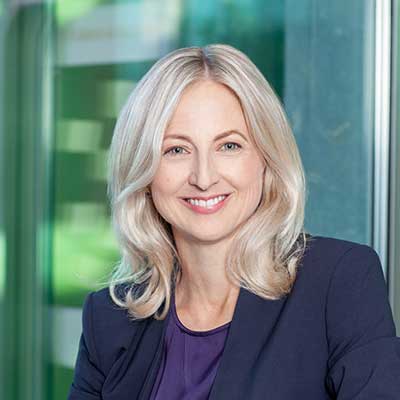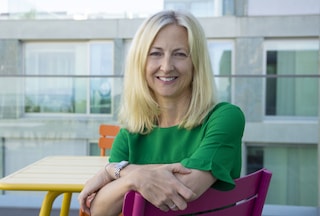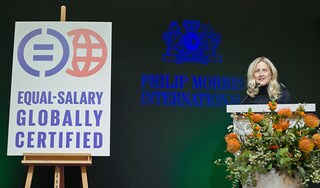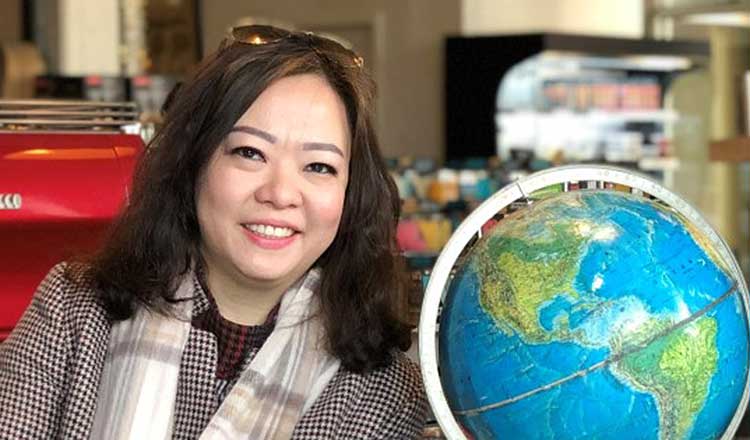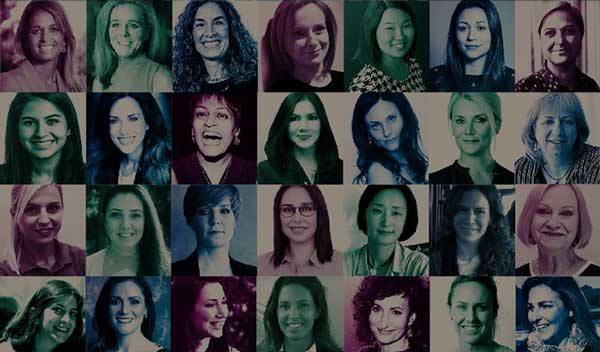My first instinct when I started this job was to doubt that I could do it. It was outside the scope of my formal training and expertise and a considerable jump in leadership level. My younger self, plagued with self-doubt, would have turned it down. In fact, years ago I did turn down a promotion to my first management role at PMI. Fortunately, at the time, my new boss-to-be – who became an important mentor – encouraged me to take the leap by giving me some very practical advice. He said translate your concerns into answering the question “What would it take for me to succeed in this role?” And then demand all the support you need – training, mentoring, support from peers and your boss.
I think a lot of women have similar feelings of self-doubt. I’m sure men do too, but I believe women tend to react differently to them. Indeed, various studies have shown that women feel they need to be fully proficient in the skills required by a job before they feel comfortable taking it; men, on the other hand, will usually jump right in, sure that they can gain the necessary skills as they go.
A passion for women's rights
So fast forward to two years ago, and remembering that advice, I took the job anyway. I have been stretched out of my comfort zone, and there have been plenty of mornings when I’ve felt completely overwhelmed, out of my depth, and been tempted to hide under the bedcovers. In those kinds of dark moments, when the self-doubt gets loud, I still try to focus on my strengths and how I can bridge the gaps. Ironically, I find my own personal courage to keep going from the fact that my purpose is to create a more inclusive, gender-balanced workplace at PMI. And, in particular, to help remove the barriers to women progressing to leadership roles. I can hardly encourage others to step up if I’m not walking my own talk.
It’s a position I never saw myself in, even though I have been passionate about the rights of women and girls since I was growing up in Australia. I was being groomed for this role since the day I was born, though I didn’t know it. We were a family of daughters (I am the oldest of four sisters), so “girl power” was a given in our home. With our decidedly female majority – even our dog was female – it never crossed my mind throughout my childhood that boys could
do anything better than we could.
It never crossed my mind throughout my childhood that boys could do anything better than girls could.
A MORE INCLUSIVE AND GENDER-BALANCED COMPANY
In recent years, PMI has made some really good progress in becoming a more diverse, inclusive and gender-balanced organization. In numeric terms, our initial goal is to increase the representation of women in management roles across the company to 40 percent by 2022; as of December 31, 2018, that number is 35 percent, which is up 6 percentage points since year-end 2014. So I’m confident that we’re on track to meet that goal.
More important than numbers but more difficult to measure is changing culture – there’s an increasing sense of humility, curiosity, and openness. I take so much energy and inspiration from the women and the men I work with every day who have a genuine desire to support the achievements of each other and create a more inclusive workplace for all. For example, throughout the week in the lead-up to International Women’s Day (8 March), we've been sharing stories of inspiring women from across the globe in a drive to elevate female role models at PMI.
We also planned a host of events and networking opportunities for the women and men of PMI, all focused on celebrating the benefits of diversity, equity, and inclusion.
Globally certified for Equal Pay
And on March 4, we became the first multinational company to obtain a global EQUAL-SALARY certification, from the nonprofit EQUAL-SALARY Foundation. This certification verifies that PMI pays men and women equally for work of equal value everywhere we operate all over the world. This is an achievement of which I am particularly proud. I wanted us to back up our words and good intentions in relation to gender equality with practical, third-party validation that we are getting the basics right, and from which we can then continue to build. And I wanted to make a big, bold statement – so rather than certify our affiliates in a handful of counties each year, I pushed a proposal to have the foundation simultaneously audit all our locations around the world.
PMI is changing from within, and these initiatives and many others are proof points to the outside world. Not to mention an answer to my own questions about my abilities.
Sharing what works for me
To the extent it might help other women overcome doubts they may have about their own capabilities, here’s what’s worked – and continues to work – for me.
- Stay true to yourself – know yourself, your values, and principles If an opportunity isn’t right for you, don’t be afraid to say no. Equally, don’t be afraid to say yes to the right opportunity. Only you can make decisions that are right for you. Knowing your values and priorities makes that easier to do.
- Do venture outside of your comfort zone; take the initiative and welcome new challenges – and challenging projects. If you believe you aren’t entirely prepared, ask for support.
- Don’t make long-term decisions based on a short moment in time. Often things have seemed really difficult, and I’ve been on the brink of quitting – then six months later, the situation is better. But, on the other hand, do know when
to draw a line and stick to it.
- Build a circle of support around you. Find mentors and peers with different strengths you can go to for advice. The relationships don’t have to be part of an official mentoring program, and they don’t have to be with the most senior people in the company. It’s often the people who work with you regularly and who have the chance to observe who can give you the most valuable feedback and advice. You do need to take a risk to find and ask people to support you. You have to make
connections and build relationships.
- Finally, remember to be kind to yourself. Don’t beat yourself up for mistakes or for all the things in your life you think you’re not doing well enough. I’ve done that. I think we all have. I now try to remind myself that I’m doing the best I can. Sometimes, it’s amazing. Sometimes, it’s not, but that’s ok.
